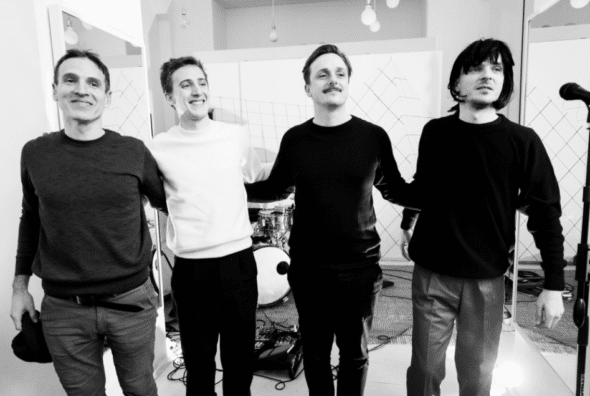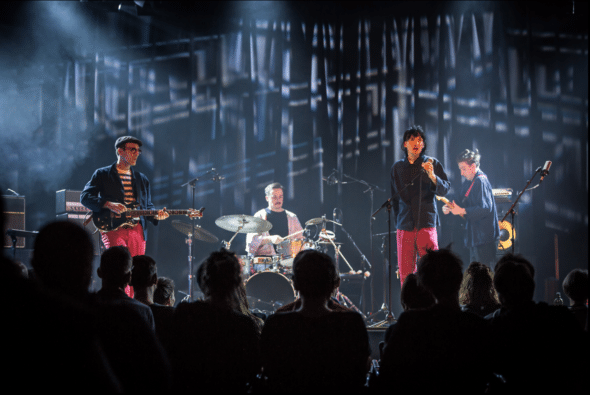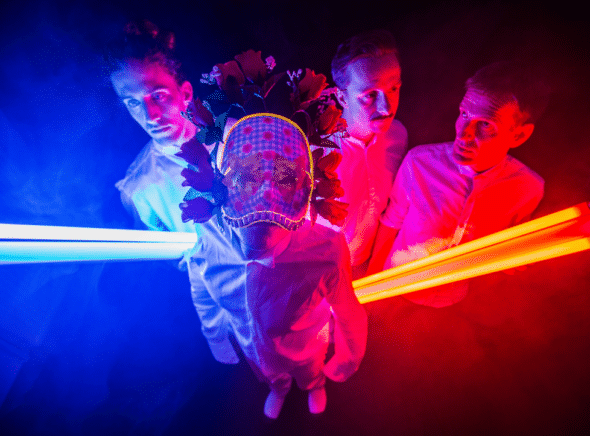
Their first album brought with it the immediate snagging of the German Record Critics’ Award and, despite corona, even some concerts occurred. Emerging from the SYNESTHETIC OCTET founded by clarinetist VINCENT PONGRACZ, bassist MANUEL MAYR, drummer ANDREAS LETTNER, guitarist PETER ROM and PONGRACZ himself, created the band SYNESTHETIC4 which is paving its own colorful way with elements of hip-hop, jazz, funk and contemporary seriousness, while sending direct impulses to the laughing muscle. A conversation with Sylvia Wendrock.
On October 7, 2020 your LP “BR TAKA BOOM” was released without a party. How does that feel?
Vincent Pongracz: We had exactly hit the open time-window in October. Under these circumstances, the Porgy&Bess club was actually well attended for the release, we had a nice concert. There were just no other gigs, no tour either.
And how are you working now? How are the pieces created?
Vincent Pongracz: At the beginning of the project, we worked very intensively as a duo and tried out a lot. Certainly not everything was fully developed, in any case there is still a lot that can be developed in our ongoing collaboration. There are an amazing number of possibilities for composing in pairs and finding creative concepts. On the first CD, some pieces were created together and turned out great simply because of that. But there are also pieces written only by me or Peter. During our formative period in 2018/19, we played the concert series “Synesthetic Wednesday” once a month at Rhiz, which strongly influenced our compositions, the individual musicians spoke up and got more involved as a result.

When do your pieces stop being through-composed?
Vincent Pongracz: They never stop.
And how do all of your voices come through?
Vincent Pongracz: First of all, everyone has to understand and internalize the composition.
Manuel Mayr: Grasping the composition and recognizing in which direction it could go is essential. Andreas and I can tell you a thing or two about that. The sheet music is perfect as it constitutes only the most necessary information. Vincent has found a great way to present his musical ideas and rhythmic constructs in a simple way. Once you have understood these principles, which then are quite complex in detail, you can communicate quite well with or in this language. We have picked them up pretty well over time as a band and as a collective. Yet Andreas and I are still bringing in our own aesthetics in terms of sound and phrasing.
Is the contemporary, the composed part the core that differentiates Synesthetic4 from your other respective projects? How do you recognize that this is you? What is your unique characteristic?
Manuel Mayr: Every form of collective collaboration can take different shapes. Consequently, every group is different. For us, there simply was an evolution. Vincent’s music has been played in many different formations. Through accumulated experience, the idea of which instrumentation works well will probably have established itself. The size of the band is also an economic decision. A quartet is perhaps still in the midfield.
Vincent Pongracz: There are different levels. The stylistic level, which classifies rather formally how innovative the ideas are, and the energetic level, where the details are happening. Since the band members are all very experienced, a lot of detail can happen on a micro level. That’s where the personalities, experiences and a lot of concentration come into play. The combination of individual elements is already specific: the way hip-hop grooves are played, for example.
Concerts are, after all, always a bit about taking people into a different, trippy world of rapture, away from their everyday lives and the pressures of the world
Was the rap-like element added to the octet then?
Vincent Pongracz: Of course there was a strong hip-hop influence on our music. Manuel and I also played together in the octet, and when octet members were prevented from playing more and more often at gigs abroad, and the economic aspect too was becoming more important, the quartet developed. We all felt like playing in a smaller ensemble, where everyone has more space and where a different feeling for playing arises, but the whole thing is also more fragile. There was more room for experimentation, also for rapping, with the octet the focus is simply somewhere else. Rap takes on the function of rapture for me. Concerts are always a bit about taking people away from their everyday lives and the pressures of the world into a different, trippy world of rapture. Intuitively and unconsciously, some of this certainly flows into the music and also into the videos. The four of us are lucky enough to achieve such extraordinary, special states of consciousness through concentrated music making.

It sometimes sounds like Israeli spoken backwards, sometimes Hungarian, sometimes Romanian – how does the language part come in?
Vincent Pongracz: I was playing it backwards the other day and thought I heard an Arabic sound. Basically, the idea was how does a kid perform English hip-hop when they don’t understand the language yet.
Is the focus on fun or is it a satire on hip-hop?
Vincent Pongracz: No, it’s not meant to be funny, it’s more a truly joyful expression and additionally a questioning of importance. Similar to Dada, I’m trying to take the seriousness and depth of meaning out of things.
When talking about content, the question arises about the stories of the songs, which are encoded by an artistic language. Or is it more about a democratization of the individual musical elements?
Peter Rom: The emotion is searching for the content and not vice versa. The emotion comes across and the content is actually arbitrary, and that comes across well. This language is solely Vincent’s invention and that’s how I understand it. The contents of very emotionally charged speeches are also undermined or questioned by it.
Vincent Pongracz: In fact there’s not really a made-up story. If there is, then the story arises spontaneously from the urgency of expression, possibly also from the interaction with the audience.
Who does the choreography of the music videos?
Andreas Lettner: Again, Vincent and Peter.
Vincent Pongracz: The two of us came up with very precise concepts for them and then worked with a cameraman.
And that’s why both of you are always the thieves (see “Pickedem” and “Pitch Particle”)?
Manuel Mayr: All of us are the bad guys, all the time.
Peter Rom: There’s a certain fun factor to it, of course. But that’s just one way of providing an interpretation. We just don’t want to create repetition, and as musicians we’re exploring the huge and relatively newfound field of music videos. You can superbly sketch out socio-critical attitudes, which, after all, are shining through quite unmistakably in our work.
You often wear a rosary in the videos, for example in “Pitch Particle” – does the use of costumes have a symbolic character?
Vincent Pongracz: We originally had a logo with a figure holding a flower in front of its face. I then played with it and made masks. The rapping person was supposed to be an artificial figure with a mask.
A lot of things just seem to work unconsciously …
Andreas Lettner: We trust each other completely musically and that’s why we are giving free rein to ourselves when working and improvising together. The result is then exactly who we are.
Do you also improvise on stage?
Andreas Lettner: In general, there are very powerful, precisely formulated parts in each piece, and there are very open areas in each piece as well. Whenever this openness arises in improvisation, but also in interpretation, something very independent begins to take shape. I think that’s the most exciting thing about the present: having a clear idea of something and being able to let it go at the same time, depending on how we are inspiring each other.
Isn’t it insanely tiring to send files back and forth to each other to work on a song instead of trying it out together?
Peter Rom: Of course it’s nicer to meet each other in the flesh. But we’re just taking the situation as it is, everything has advantages and disadvantages. We were in Poland together for the first CD, and a crazy dynamic developed. If everyone now records on his own at home, you can stick to your own habits better, you are in the absence of an observer and you don’t have a social function.
Is such a digital collaboration only fruitful if you already know each other (well)?
Andreas Lettner: That is definitely a huge advantage. The recording possibilities are not there for everybody in the same way. Especially with drummers – I happen to be blessed to have everything on site. For us, it also works out very well because the direction is clear and we know what we want to do. If we had gotten into this situation at the beginning, I definitely would have had trouble knowing how to implement the basic idea. So maybe it’s even partly an advantage for us to play alone, because it allows everyone to work on their part in a clearer and more focused way.
Vincent Pongracz: Because of the clarity in knowing about the idea, everyone picks up his part without much effort. I can check out a lot by being alone, try different moods, play around more with the voice regardless of the time of day – in a band setting you’re automatically louder after all.
But the search for borrowing from other languages ultimately led me back to the onomatopoeic method
Have you developed any more languages, Vincent? Is there a syntax there?
Vincent Pongracz: Originally, it was just an intuitive borrowing from strong language or words that are increasingly found in hip-hop, because they have a strong emotional component to them. Later on, I wanted to write lyrics on certain topics like revolution or craziness, and needed even more words. But in the end, the search for borrowings from other languages led me back to the onomatopoeic method: modifying existing words into an abstract form, so that the imagined sonic equivalent is achieved. I’m always following the desire to make or find something new, and to push the limits. But this in a playful, less conceptual or intellectual way. Sometimes dissatisfaction with the existing stuff is the motor, then again it’s sheer curiosity about new territories or strong expressions. So I’m always looking for places that are not yet occupied. It’s not so much the intellectual idea of innovation, although I can’t assure that one hundred percent either. After all, it’s always about knowing the context and also being aware of what’s happening in the moment.

Manuel Mayr: In this respect, rap or dis-rap is also a statement on forms of pop culture, and hip-hop is no longer a one-dimensional matter. Modern pop culture provides us with many points of reference. Nevertheless, the perception of this language remains very subjective.
Is there a discontent that everyone is carrying into their music?
Andreas Lettner: No. The only important story for me on stage is to be completely in the moment and let go of everything I think I know or can do. That’s my only approach. Ears to the ground and that’s it.
Vincent Pongracz: There are two different things for me: the art I’m creating and the stage moment. These are two different approaches. As soon as you go on stage with a message, it becomes theatrical and doesn’t fit the age of the audience.
Peter Rom: Yet there is this saying: “Play from your pain”. I actually follow that. If you want to express yourself and make an honest statement, it’s also a bit about the relationship between your own personality and the outside world. That’s so incredibly complex that it’s impossible to find a single term for it. You wouldn’t need to take this complicated detour via music, but could convey it in words as a writer. To me, language seems too limited for that, and with that I’m touching upon the old question of whether thinking or language are happening in the brain first. The things that can be expressed in music can’t be put into language in an interview like this one. Themes also are only vehicles for basic emotions and I’m fascinated on stage by the human being per se, thrown into the world.
What you can’t talk about, you have to make music about.
Vincent Pongracz: This rapping person can directly express a lot more joy, and joy also in being decidedly self-centered or indulging in a certain foolishness and inconsideration. Things that don’t make sense or that I wouldn’t allow myself to do in everyday life. The rap persona is someone else than the playing musician, the voice works in a much more direct way for me than the instrument. There’s usually a switch happening between two setups in my head. We are constantly trying to create our own world. The videos were just a very first step. Over time, of course, more and more ideas emerge. Isn’t everything you do new, because it always has a personal touch?
Thank you very much for the interview!
Sylvia Wendrock
Links:
Translated from the German original by Julian Schoenfeld
